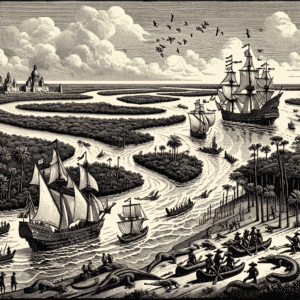
13th January 1865
Lionel,
As I sit here in the dim glow of a lamp, penning this letter, I can’t help but marvel at the twists my life has taken. Your name comes up often in my silent thanks, old friend, for it was your hand that guided me to Demomire.
My adventures in Africa seem a distant memory now, their vividness fading against the backdrop of this isolated town. Demomire is like none other; it is rich in gold and other resources, its people as varied as the architecture that defines its skyline. And at the heart of it all stands Blackwood Manor – my current charge and abode.
I must confess, there is something deeply satisfying about managing the manor’s construction and updating. Each day brings with it new challenges, nestled within the very walls I roam. The workmen are sturdy folk, hewn from the same hardy stock as the land itself. Under my oversight, their hammers and saws sing a chorus of progress amidst the Eastern Sentinel Mountains.
The manor’s lore is as layered as its foundations. You were right to think I’d find fascination here; Blackwood Manor is steeped in history. Its origins trace back to Prince Leopold George Rákóczi, Prince of Transylvania, who laid its cornerstone not long after Demomire’s founding in the late 1680s. A prince building a manor in this untamed land – imagine that!
Baron Blackwood is merely the latest in a lineage of owners stretching back over centuries. He carries his legacy with an air that’s both regal and cryptic. The man is an enigma wrapped in tailored finery, but he has been fair to me thus far. His directives are clear: oversee the manor to make sure it not only stands but flourishes as a beacon of his family’s enduring presence and to become the manager of his other business enterprises, so that he is free to pursue his own interests; whatever they maybe.
In addition to the tasks at Blackwood Manor, my duties extend to the very bowels of the earth itself. The Baron, a titan of industry, has vested in me the oversight of Demomire’s mining operations. It’s an endeavor that sets my pulse racing, akin to the thrill of our youthful exploits, though now bound by responsibility rather than reckless abandon.
The mines here are unlike any I’ve encountered. We extract not just gold and precious gems – though there is plenty of that – but also minerals whose names dance strangely on my tongue. It is peculiar, however, that amidst this cornucopia of valuable resources, there is a conspicuous absence: coal. There are no coal mines in Demomire, no soot-blackened faces nor smoke-choked skies.
The lumber mills are another testament to the Baron’s empire and his progressive vision. Here timber is processed with machinery so efficient it would astound our forefathers. It operates with nary a whisper compared to the cacophony one would expect from such an establishment.
You should see the shipyard at the port where Moreau River kisses River Bison goodbye. Ships are built with precision and care, ready to carry Demomire’s bounty across waterways far and wide. The craftsmanship is impeccable; each vessel a floating testament to man’s mastery over nature.
The Baron has also dabbled in agriculture, transforming what were once fallow fields into lush farmland through ingenious irrigation and crop rotation techniques. It seems his touch turns everything to gold – metaphorically speaking, though I suspect he could manage it literally if he so desired.
And yet for all this industry and innovation, there is no exploitation here. The workers are treated fairly; their health and well-being given as much attention as the machines they operate. There’s even talk of building schools for their children – another concept you’d be hard-pressed to find elsewhere in these times.
But for all my familiarity with Demomire’s enterprises, there remains much I do not know. The Baron assures me that answers will come in time – that our upcoming excursion will unveil more of the inner workings of this town’s heart and its peculiar beat.
Prince Leopold George Rákóczi didn’t only construct the Manor, he also gifted the town a Library. A noble gesture, its stones laid with the promise of a repository for all human knowledge. It’s a grand structure, the Library, with columns that speak of ancient Greece and windows like the eyes of a watchful owl. I sometimes find myself drawn there on days when the sun hangs low and the world is tinged with gold. The quietude within its walls is a rare treasure; it feels as though one steps into another realm, where time is measured by the turning of pages rather than the ticking of clocks.
And what pages there are! Rows upon rows of them, leather-bound and gilded, some so old you’d fear they’d crumble to dust at a touch. The air smells of vellum and wax, a scent that lingers on you long after you’ve departed. But it’s not just the age or breadth of the collection that fascinates – it’s the depth. Books on every subject imaginable line those shelves, from Aristotle to zoetrope’s. The library also serves as a beacon to those whose thirst for knowledge seems unquenchable. Scholars travel from far and wide to study within its walls. Some come seeking answers to questions I reckon aren’t meant to be asked.
The architectural tapestry of Demomire isn’t solely the creation of Prince Leopold George Rákóczi; the initial settlers hailed from various corners of Europe, and their diverse cultural imprints still reverberate throughout the terrain. Another sovereign also left his mark on Demomire—King Louis XIV. It was he who erected the Abbey. This anomaly dates to the era of King Louis XIV, when the territory destined to become Demomire was merely a sliver of the expansive European imperial domains. Notably, it was the extravagance-embodying King Louis XIV who commanded the establishment of an abbey in what was, at the time, a secluded segment of the immense Louisiana territory. The rationale for this decision, which appears incongruous with his opulent reputation, is enshrouded in enigma, a segment of history that has evaporated into the mists of antiquity.
The nuns of this cloistered order are unlike any I’ve encountered in my travels. Their presence is as enigmatic as their history. Most have taken vows of silence, which they observe with a discipline that’s nothing short of unnerving. When I first arrived in Demomire and laid eyes on the Abbey perched on the mountainside, shrouded in mist like some forgotten castle, I couldn’t help but feel a chill that had nothing to do with the altitude.
I had occasion to witness them in town once—rare as that is—garbed in habits that allowed no glimpse of personality or preference. They moved with purpose through the streets, eyes downcast, unspeaking, untouched by the clamor around them. It’s said they venture down only to trade in herbs and medicines—potions for every malady known to man or beast—and their skill in this regard is highly sought after.
I have met some good people while I have been here, yet even among all these people, there’s one absence felt more keenly than all others: Victoria Maddox.
I’ve crossed paths with many since setting foot in Africa, but none have left quite the mark Vic did—nor the scars. You remember well our entanglement: brief as a desert storm yet intense enough to leave dunes shifted in its wake. Our shared history is etched into my skin as surely as any tattoo might be.
I confess there are nights when I miss her—her fierce independence, her intelligence sharp enough to cut glass, her laugh that could chase away any shadow lurking in my heart. But deep down, beneath layers of betrayal, I know it was for the best that we parted ways.
Our worlds were too different; like oil and water, we could mix under tumultuous conditions but would inevitably separate once settled. And while Victoria’s path led her deeper into the darkness—embracing brutality as if it were a lover—I sought solace in exploration and discovery.
She believed I owed her something; perhaps she was right. Yet debts like ours aren’t settled by coin or blood—they linger like ghosts at the edge of our dreams until we learn how to lay them to rest.
Do not misunderstand me; there is no ill will harbored in my heart for Vic. If anything, there is admiration—for her tenacity, for how she carved out a place for herself in a world that offered no quarter for women like her.
But I digress, let me assure you, Lionel – your faith in sending me here was not misplaced. I will need you to go ahead and draw up those contracts, it seems I’ll have a need of them now.
I am ever your indebted friend,
Cody Everette





